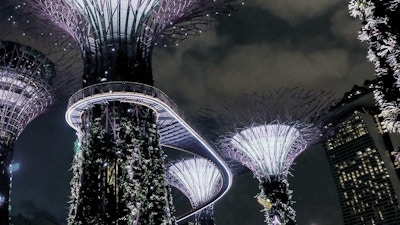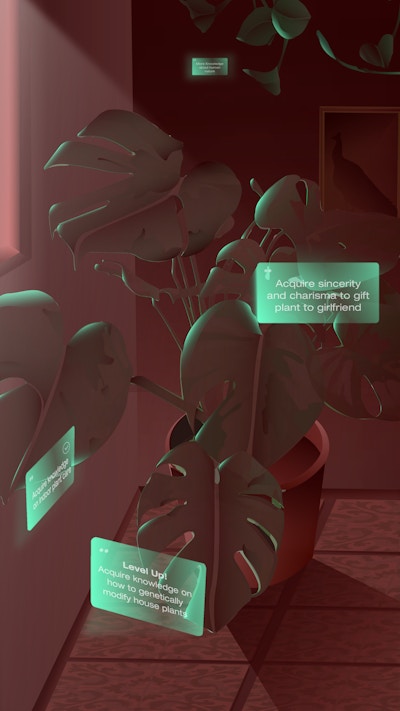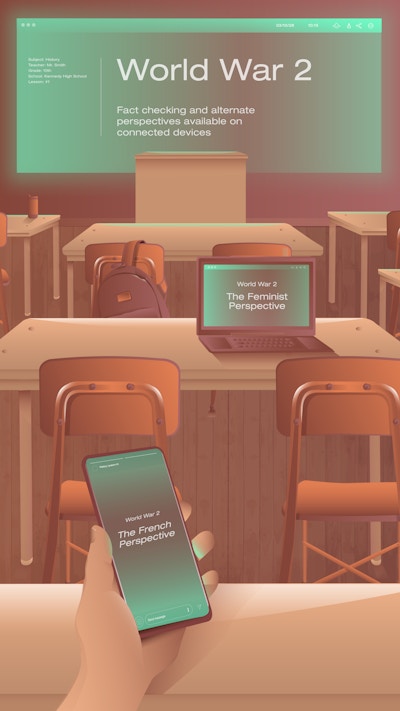Future Dualities: Convenience & Consideration
Customer centricity works against sustainability. This is part four of our Future Dualities series. If you’re new here, see the intro, part two, and part three before reading on.

Contact info for Eden Dotan
Contact info for Lasse Underbjerg
Global Future Lab Director
Thinking ahead is messy. In futurism, it's a widely accepted fact that we can't predict one true future. There is not one direction forward, but many different — sometimes contradictory — directions happening at once.
Paradoxically, we humans still love a simple story; Good and bad. Us and them. But more than ever, we need to shift away from simplified, binary thinking. If we want to design truly sustainable futures for both planet, people, and profit, we need to stop oversimplifying our choices. Explore the continuum, present and beyond. But it's not an easy feat.
To start, we interviewed thinkers and creators from across the world and across competencies to get a deeper and wider perspective on the possibilities and pitfalls ahead. Our conversations led us to five overarching dualities through which we can view, explore, discuss and even start shaping strategies for potential futures.
This article will dive into the third of these five dualities: Convenience & Consideration.
Convenience: Laziness is driving innovation
Convenience is king. It has become the norm across industries from e-commerce to healthcare, driving innovation, competition, and above all: human-centred experiences.
'All of a sudden, we can challenge the idea of education. How can we make education more effective? Education is not about four walls. Learning is bigger and can be more organic than we make today. There is really good education online, at an accessible price for a lot of people.' — Gaston Lisak, Founder of Random Happiness
We can watch a full series in an evening without lifting a finger. We can get the home supplies we need delivered to our front door from one hour to the next. We can join a new insurance policy in under five minutes. We can consult with doctors anytime, anywhere, if we notice a troubling symptom.
'Evolution did not equip us to deal with abundance, with affluence. There was always scarcity.' — Thomas Hylland, Sociology Professor, University of Oslo
Our desire for convenience, and our bias towards instant gratification, are met by corporations with solutions that delight, support, and profit. But the solutions often come at a greater cost: exploiting people, hurting communities, and destroying the environment.
'We have a very good side and a very bad side. And our bad side is really profitable. Our good side is not.' — Gloria Duran, artist, activist, and professor of feminism
Consider the implications for your organisation. In a future of hyper convenience, you need to own the complexity of making it easy.
- Where is convenience key to your value proposition? Where is it not?
- How do you build meaning into seamless experiences?
- What legacy is holding you back from providing true ease?
Consideration: From human-centred to humanity-centred
For the first time in a long time, we have witnessed the frightening truth before our eyes: our resources are limited. Sustainability is no longer the ethical choice; it's the existential choice.
'Businesses need to start thinking of extending their think tanks and adopting a different mindset. One that goes beyond their post-COVID recovery and growth strategy plans, one that takes a longer-term view of the world, but not as a "nice to have" or "philanthropic endeavour".' — Laura Schwamb, Founder of Project61
Businesses and market leaders around the world, from BlackRock's Laurence Fink to IKEA's Jesper Brodin, are shifting towards sustainable investment and production. And with the help of longstanding and emerging brands, people are increasingly adopting more responsible consumption.
'Young people don't accept the unsustainable use of resources. They demand better solutions. And will make them themselves!' — Frank Rosengreen Lorenzen, CEO, Danish AM Hub
But a sustainable choice is often a privileged one considered by those with the luxury to consider it and chosen by those with the means to afford it.
'Purpose-ism, as corporations have wielded it, is predatory. People are looking for meaning, and companies are right there to offer it to them, in exchange for long hours, loyalty, and high productivity.' — Nina Montgomery, Author of Perspectives on Purpose and IDEO Design Lead
Consider the implications for your organisation. In a sustainability-first future, you need to consider the broader side effects of your business.
- What is standing between your organisation and a true dedication to sustainability?
- How can you make sustainability accessible and top of mind for everyone?
- What negative side effects does your business have on communities and environments?
Of course, the range between convenience at all costs and sustainability above all else is vast. Often, one can actually serve the other. Let's take CopenHill as an example: A public ski slope located on the roof of a power plant. The facility is so clean that it can simultaneously serve as a social, outdoor arena, a brilliant example of hedonistic sustainability.
Possible futures lie on each end of this spectrum and at any tension points in between. Each of these futures carry implications on diverse industries and markets. And we can begin to understand and explore these implications when we turn imagined possibilities into tangible artefacts.
We use dualities to inspire tangible future scenarios that get designers and businesses thinking, feeling, and beginning to devise and test strategies for the future.
Let's look at education.
A concept on the brink of drastic change as classes go remote, accessibility increases, and university degrees risk becoming obsolete. What does hyper-convenient learning look like? What does it look like in a place created for deep thoughtfulness and consideration?
Take a look at the possible future scenarios below. What implications could they have for educational institutions and businesses? What responsibilities and opportunities could arise for your organisation?

Why learn, when you can instantly know?

Because the truth is subjective.
Stay tuned. Next up in our Dualities series is Automation & Serendipity. How are we seeing this duality play out today? How could it shape a particular industry in the future? And what questions should you be asking about your organisation moving forward?
To learn more about what lies ahead, we built our very own Futures Generator. Don't forget to take it for a spin - the results may surprise you.
Interested in giving the futures of your business some more thought? We’d love to have the conversation. Get in touch.